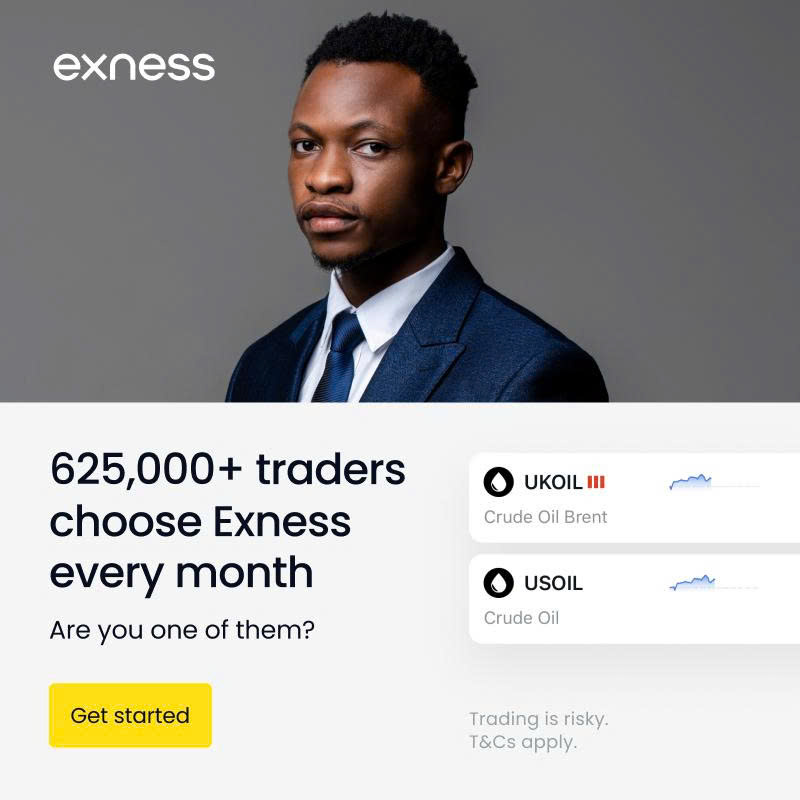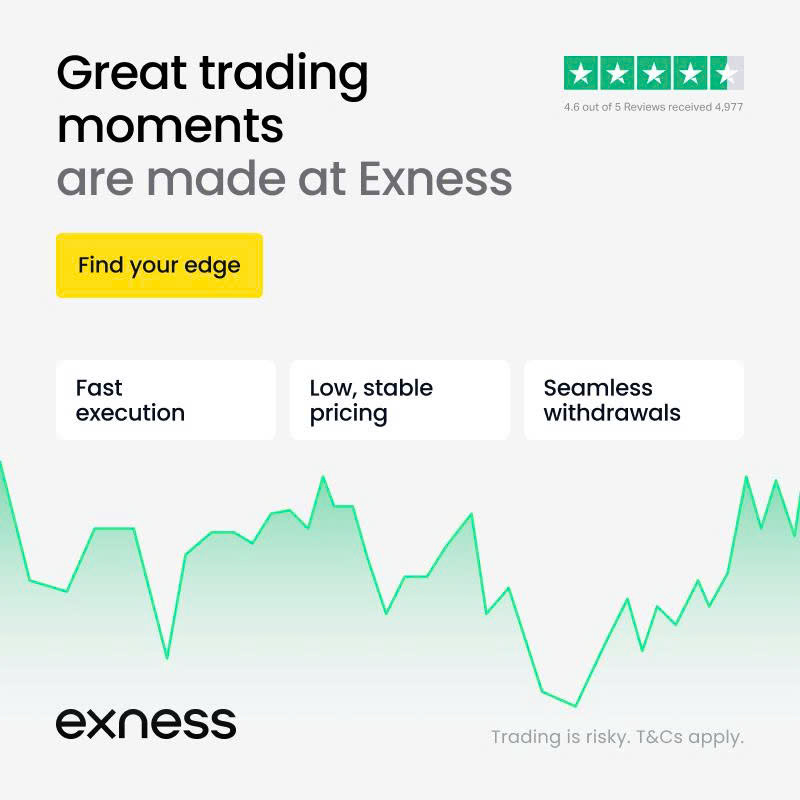
9 minute read
Does Exness Charge Commission? A Comprehensive Guide
from Exness
by Exness Blog
When choosing a forex broker, one of the most critical factors traders consider is the cost of trading. Fees, spreads, and commissions can significantly impact your profitability, especially for high-frequency traders or those with tight budgets. Exness, a globally recognized forex and CFD broker, is known for its competitive trading conditions, but a common question arises: Does Exness charge commission? In this in-depth guide, we’ll explore Exness’ commission structure, account types, and other fees to help you make an informed decision. Whether you’re a beginner or a seasoned trader, this article will break down everything you need to know about Exness’ fees in 2025.

💥 Trade with Exness now: Open An Account or Visit Brokers 🏆
Introduction to Exness: A Trusted Forex Broker
Founded in 2008, Exness has grown to become one of the leading online brokers, serving over 1 million traders worldwide. Regulated by top-tier authorities like the FCA (UK), CySEC (Cyprus), and FSCA (South Africa), Exness offers a secure and transparent trading environment. The broker provides access to a wide range of financial instruments, including forex, commodities, stocks, indices, and cryptocurrencies, all accessible through user-friendly platforms like MetaTrader 4, MetaTrader 5, and the Exness Trading App.
Exness is praised for its low spreads, fast execution, and flexible account types. However, understanding its fee structure is crucial to determining whether it aligns with your trading goals. Let’s dive into the key question: Does Exness charge commission?
Does Exness Charge Commission? The Short Answer
The answer depends on the type of account you choose. Exness offers several account types, and only certain ones incur commission fees. Specifically:
· Commission-Free Accounts: The Standard and Pro accounts are commission-free, with trading costs primarily covered by spreads.
· Commission-Based Accounts: The Raw Spread and Zero accounts charge commissions per lot traded but offer tighter spreads, making them ideal for high-volume or professional traders.
To understand which account is right for you, let’s explore Exness’ account types and their fee structures in detail.
Exness Account Types and Their Fee Structures
Exness provides a variety of account types tailored to different trading styles and experience levels. Below, we break down the commission and fee structures for each account type.
1. Standard Account: Commission-Free Trading for Beginners
The Standard Account is designed for novice and casual traders. It’s the most popular account type due to its simplicity and accessibility.
· Commission: No commission is charged. Trading costs are included in the spread.
· Spreads: Spreads start from 0.3 pips for major forex pairs like EUR/USD, but they are typically wider than those on professional accounts (average spread of 1.0 pip for EUR/USD).
· Minimum Deposit: As low as $10, depending on the payment method.
· Swap Fees: Swap-free trading is available for certain instruments and regions, such as Islamic accounts.
· Best For: Beginners, low-budget traders, or those who prefer simplicity.
The Standard Account is ideal if you want to avoid commission fees, but keep in mind that wider spreads may increase your overall trading costs, especially for high-frequency trading.
2. Pro Account: Low Spreads, No Commissions
The Pro Account is geared toward experienced traders who want lower spreads without paying commissions.
· Commission: No commission is charged.
· Spreads: Spreads are tighter than the Standard Account, starting from 0.1 pips for major pairs (average EUR/USD spread of 0.6 pips).
· Minimum Deposit: Starts at $200, depending on the region.
· Swap Fees: Swap-free options are available.
· Best For: Active traders, scalpers, and those using algorithmic strategies.
The Pro Account offers a balance between low spreads and commission-free trading, making it a cost-effective choice for traders who prioritize tight spreads without additional fees.
3. Raw Spread Account: Low Spreads with Commissions
The Raw Spread Account is designed for professional traders who want ultra-tight spreads in exchange for a commission fee.
· Commission: A fixed commission of $3 per side per lot ($6 round-turn per lot).
· Spreads: Spreads start from 0.0 pips, offering some of the tightest spreads in the industry.
· Minimum Deposit: Varies by region, typically starting at $200.
· Swap Fees: Swap-free trading is available for eligible clients.
· Best For: Scalpers, high-frequency traders, and those trading large volumes.
The Raw Spread Account is cost-effective for traders who execute multiple trades daily, as the low spreads offset the commission costs over time.
4. Zero Account: Zero Spreads with Commissions
The Zero Account is tailored for traders who want minimal spreads on major instruments, particularly during high-liquidity market hours.
· Commission: Commissions start from $0.40 to $7 per lot, depending on the instrument and trading volume.
· Spreads: Zero spreads on the top 30 instruments for 95% of the trading day, with minimal spreads on other pairs.
· Minimum Deposit: Typically $200 or higher, depending on the region.
· Swap Fees: Swap-free options are available.
· Best For: Professional traders, high-volume traders, and those trading major forex pairs.
The Zero Account is ideal for traders who prioritize near-zero spreads and are willing to pay commissions for premium trading conditions.

💥 Trade with Exness now: Open An Account or Visit Brokers 🏆
How Are Commissions Calculated at Exness?
For accounts that charge commissions (Raw Spread and Zero), the fees are calculated based on the trading volume and are applied to both the opening and closing of a trade. Here’s a simple example:
· Raw Spread Account: If you trade 2 lots of EUR/USD, the commission is $3 per side per lot. For a round-turn trade (open and close), the total commission is $12 ($3 x 2 lots x 2 sides).
· Zero Account: If the commission is $5 per lot for a specific instrument and you trade 1 lot, the total commission for a round-turn trade is $10 ($5 x 1 lot x 2 sides).
Exness provides transparency by displaying commission fees in its trading platforms and trading calculator, allowing you to estimate costs before placing trades.
Other Fees to Consider at Exness
While commissions are a key consideration, other fees can impact your trading costs. Here’s a breakdown of additional fees at Exness:
1. Spreads
Spreads are the primary trading cost for commission-free accounts (Standard and Pro). They represent the difference between the bid and ask price of an asset. Exness offers competitive spreads, with:
· Standard Account: Average EUR/USD spread of 1.0 pip.
· Pro Account: Average EUR/USD spread of 0.6 pips.
· Raw Spread and Zero Accounts: Spreads as low as 0.0 pips, but commissions apply.
Spreads can widen during volatile market conditions, such as major economic news releases, so always check real-time spreads on your trading platform.
2. Swap Fees (Overnight Financing)
Swap fees, also known as overnight financing, are charged for positions held open past the daily cutoff time (typically 10:00 PM GMT). These fees are based on the interest rate differential between the two currencies in a pair.
· Exness offers swap-free trading for certain instruments and regions, particularly for Islamic accounts, allowing traders to hold positions without incurring overnight fees.
· For non-swap-free accounts, swap rates vary by instrument and can triple on Wednesdays to account for weekend rollovers.
3. Deposit and Withdrawal Fees
Exness is known for its hassle-free payment methods, including bank transfers, credit/debit cards, and e-wallets like Skrill and Neteller.
· Deposits: Exness does not charge internal deposit fees, but third-party payment providers may impose their own charges.
· Withdrawals: Most withdrawal methods are free, but bank transfers may incur intermediary bank fees, and some e-wallets may charge small fees depending on the provider.
· Currency Conversion Fees: If your account currency differs from the deposit/withdrawal currency, Exness may apply a conversion fee.
4. Inactivity Fees
Exness does not charge inactivity fees for dormant accounts, even after extended periods of inactivity (e.g., 12 months). However, inactive accounts may be archived, requiring reactivation to resume trading.
How Do Exness Fees Compare to Other Brokers?
Exness’ fee structure is highly competitive compared to other leading brokers like XM, FBS, or IC Markets. Here’s a quick comparison:
· Commission-Free Accounts: Exness’ Standard and Pro accounts offer spreads comparable to XM’s Micro and Standard accounts but with lower minimum deposits.
· Commission-Based Accounts: The Raw Spread and Zero accounts have lower commissions than IC Markets’ Raw Spread account ($7 per lot round-turn) and tighter spreads than FBS’ ECN account.
· Non-Trading Fees: Exness stands out by not charging inactivity fees or internal deposit/withdrawal fees, unlike some brokers that impose these costs.
Exness’ transparency and flexibility make it a cost-effective choice for traders of all levels.
Tips to Minimize Trading Costs with Exness
To optimize your trading expenses, consider these practical tips:
· Choose the Right Account Type: Select an account that aligns with your trading style. For example, use the Standard Account for low-frequency trading or the Raw Spread Account for scalping.
· Trade During High-Liquidity Hours: Spreads are typically tighter during the London and New York trading sessions, reducing your costs.
· Utilize Swap-Free Accounts: If you hold positions overnight, opt for a swap-free account to avoid overnight financing fees.
· Use the Exness Trading Calculator: Estimate spreads, commissions, and swaps before placing trades to plan your costs effectively.
· Monitor Market Conditions: Avoid trading during major news events when spreads can widen significantly.
Common Questions About Exness Commissions
1. Does Exness offer commission-free trading?
Yes, the Standard and Pro accounts are commission-free, with trading costs covered by spreads.
2. How can I get zero spreads with Exness?
You can achieve near-zero or zero spreads by choosing the Zero Account or Raw Spread Account, but these accounts charge commissions per lot traded.
3. Are there hidden fees at Exness?
Exness is transparent about its fees, with no hidden charges. However, third-party payment providers or banks may impose their own fees for deposits or withdrawals.
4. Can I trade with a low budget on Exness?
Yes, the Standard Account allows you to start trading with as little as $10, making it accessible for low-budget traders.
5. Does Exness charge inactivity fees?
No, Exness does not charge inactivity fees, even for dormant accounts.
Conclusion: Is Exness the Right Broker for You?
So, does Exness charge commission? The answer depends on your account type. The Standard and Pro accounts are commission-free, making them ideal for beginners and casual traders, while the Raw Spread and Zero accounts charge commissions but offer ultra-tight spreads for professional traders. Exness’ transparent fee structure, competitive spreads, and lack of inactivity or internal deposit/withdrawal fees make it a compelling choice in 2025.
Whether you’re scalping forex pairs, trading stocks, or exploring cryptocurrencies, Exness provides flexible account types to suit your needs. By understanding its fee structure and choosing the right account, you can your trading costs and enhance your profitability.
💥 Note: To enjoy the benefits of the partner code, such as trading fee rebates, you need to register with Exness through this link: Open An Account or Visit Brokers 🏆
Read more:










